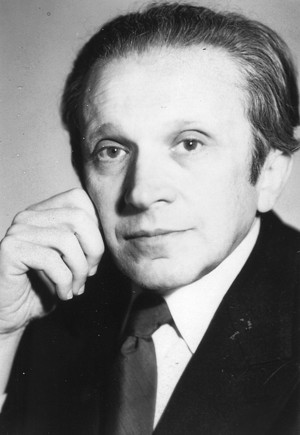Mieczyslaw WeinbergComposerComposer and pianist. Born December 8, 1919 in Warsaw, died February 26, 1996 in Moscow. He was born into a musical Jewish family, and his father Samuil Moiseyevich and mother Sonia were well-known figures in the Yiddish Theatre. His father served as the director of the Jewish Theater in Warsaw and was also a composer and violinist, while his mother was a pianist. A child prodigy, Mieczysław performed his first concert at ten years of age, two years later he began piano studies under the tutelage of Józef Turczyński at the Warsaw Conservatory, directed at the time by Karol Szymanowski. At the age of 16, he wrote his first film score. Józef Hoffman predicted a wonderful piano career for Weinberg. After Hitler's invasion of Poland, Mieczysław was the only member of his family who managed to flee eastward. Those closest to him died in the Trawniki camp. Weinberg found himself in Minsk, Belarus, where he studied composing under Vasyl Zolotariev, a pupil of Nikolay Rimski-Korsakov. After war broke out between Russia and Germany, he escaped to Tashkent, Uzbekistan, finding work in a local opera house. It was from Uzbekistan that he would sendthe manuscript of his Symphony No. 1 to Dimitri Shostakovich, who soon invited him to Moscow. Weinberg settled in the Russian capital and lived there until the end of his life. Over the past few years, Mieczysław Weinberg's works have enjoyed a growing interest. Warsaw Music Academy Professor Michał Bristigier has dedicated a few essays and seminars to his compositions, and the British musicologist David Fanning is currently working on a biography. The Austrian Bregenzer Festspiele 2010 organised a Weinbergian symposium to accompany the world premiere of his opera The Passenger based on Zofia Posmysz's novel of the same title. In 2011 the opera, directed by David Pountney, premiered at both the Warsaw National Opera and the English National opera to a full house and rave critical reviews. In 2012 the English staging was nominated for the Laurence Olivier Award, the most prestigious British prize in the field of theatre. As part of the Polska Music programme, the NEOS music label together with the Adam Mickiewicz Institute released five albums of Weinberg's works recorded at the Bergenzer Festspiele in 2010. The Passenger is the first of seven operas by Weinberg, a Polish Jew who escaped from Poland, without his family, to the Soviet Union when the Nazis invaded in 1939. The Passenger is based on the real-life experience of Holocaust survivor Zofia Posmysz, who was imprisoned in Auschwitz during World War II. Posmysz’s book, The Passenger, forms the basis of the libretto by Alexander Medvedev. While sailing to Brazil, Lisa, a former SS Officer from Auschwitz, believes she sees a former inmate and confesses her past to her husband. Interwoven with the story are flashbacks to her time in the concentration camp. Weinberg’s opera was effectively banned in the USSR and only received its premiere in Bregenz fourteen years after the composer’s death. An encounter between two women - one a former Auschwitz guard, the other a former prisoner - plunges them both back into the horrors of the Holocaust, pitting perpetrator against victim in a moral battle between guilt and denial, retribution and absolution.
|


